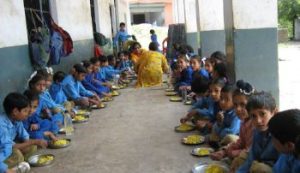Arif, the owner of a 15-year-old meat shop in the older part of Gurugram, is a worried man. The Gurugram municipal authority has ordered meat shops and slaughterhouses to shut down for nine days between August 24 and September 1 for a Jain religious festival. Gurugram, which is located a stone’s throw from India’s capital New Delhi, is the hub of swanky shopping malls and condominiums.
Jains comprise around 0.4 percent of India’s population. One of the main tenets of their religion is to practice ahimsa, a non-violent life. They are strict vegetarians and do not eat anything that can cause harm to another life form.
The closure order came on the direction of the Hindu nationalist Bharatiya Janata Party (BJP)-led Haryana state government.
With the wages of four full-time employees and the fixed rental for the shop to pay every month, Arif is apprehensive about the huge loss of earnings he will suffer during those nine days of shop closure. A violation of the order is sure to be punished with a fine of 5,000 Indian rupees (approximately $63), he adds. Incidentally, his shop sales amount to just about $50 a day.
Since last year, meat shops in Gurugram are not allowed to operate on Tuesdays “respecting Hindu beliefs” on orders of the municipal authority. Tuesday is considered a holy day by a section of Hindus in north India.
Ravi Grover of Dina Bandhu Dina Nath, a leading meat business in Gurugram, is not pleased with the prospect of sustaining losses for nine whole days. He wants the government to rethink its closure diktat. Contrary to the image painted by the Hindu right-wing that it is non-Hindus who primarily eat meat, Grover says that he and his family are Punjabis and they eat non-vegetarian food every day.
The nine-day closure in August for the Jain festival of Paryushan Parv is a first. However, in April, meat shops were closed for the nine-day celebration of Navratri, a Hindu festival. Eyebrows were raised when even in posh south Delhi, the BJP-ruled municipal corporation ordered meat shops to down their shutters for Navratri on the plea that the “foul smell” of meat offended the religious sentiments of Hindus who observed a “strict vegetarian diet” on those days.
It is evident that the increasing number of meat bans is part of a larger narrative by the BJP and right-wing groups to paint meat-eating as an aberration and impure.
Without mincing his words, senior editor Pankaj Pachauri tweeted: “Anti-meat campaigns are a bogey. Even more than a quarter of Jains eat meat.” He added that it was a “focused attempt to hit at Muslim community’s businesses. #meatban is sinister. It should be a personal choice.”
There is a concerted attempt to portray meat-eating or non-vegetarianism as an exception to the norm in India. However, research studies on the dietary habits of Indians point to the contrary. The National Family Health Survey NFHS 5, conducted between 2019 to 2021, shows that the number of meat eaters had actually increased since the last survey, NFHS 4.
It is true, however, that a large section of butchers hail from the Muslim Qureshi community. Delhi University professor Apoorvanand, who has been consistently speaking out against the growing communalism in the country, says that the targeting of Muslim-owned businesses is part of a planned strategy to cripple Muslims economically. The campaign of Hindu right-wing organizations, he points out, “is not confined to the meat business of Muslims. They are systematically moving towards a social boycott of Muslims to break them economically.”
Ever since the BJP came to power in India eight years ago, emboldened Hindutva groups have been enforcing rigid codes of normative Hindu culture and Islamophobia.
The BJP government has been thrusting across the country a version of Hinduism that is associated with the Hindi-speaking regions in North India, one that includes vegetarianism, and the supremacy of Lord Ram and the Hindi language, thereby obliterating the unique regional and cultural identities across the length and breadth of India.
The emphasis on vegetarianism has extended itself to myriad spheres, be it the erstwhile government-owned airline serving only vegetarian meals, higher education institutions frowning upon meat figuring in hostel menus, and now even government schools insisting on vegetarian meals for school children.
An editorial in the Indian Express points out that “The myth of the vegetarian nation” has influenced policymaking relating to decisions to bar eggs from being served in the mid-day meal scheme for children in government and government-aided schools.
In BJP-ruled Madhya Pradesh, the government repealed the decision of the previous Congress regime to introduce eggs in anganwadi meals (anganwadis are government-run centers for children below the age of six). Again in Chhattisgarh, strong objections raised by the opposition BJP have forced the state government to roll back its decision to introduce eggs as part of a supplementary nutrition program in schools. Instead, it has decided to deliver eggs to the homes of students who eat them.
In Karnataka, Hindutva groups have long objected to eggs being included in school mid-day meals on religious grounds. When the state government introduced eggs as a pilot scheme to combat malnutrition among school children, many objected, arguing that “eggs are not the only source of nutrition.”
A few months ago, hostel canteen staff at the premier Jawaharlal Nehru University in New Delhi were stopped from serving non-vegetarian food at one of the hostels, leading to clashes between two student unions of opposing ideologies.
Food and dietary habits are a matter of personal choice. But that concept seems to be wholly alien to authoritarian regimes that are keen to police what all people wear and eat.

































